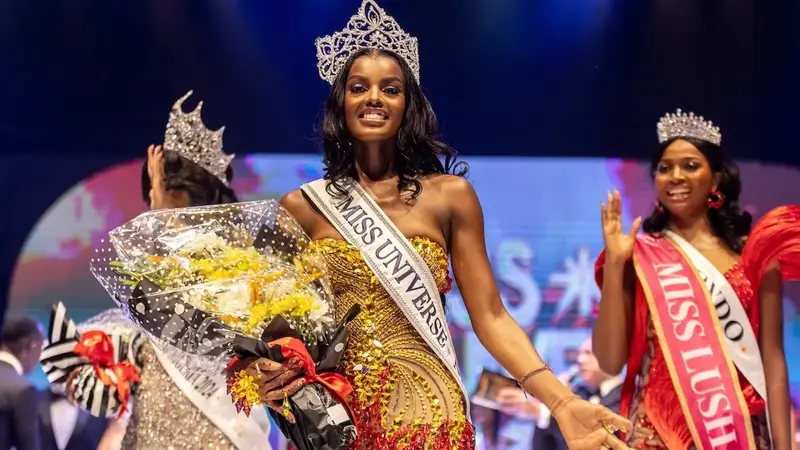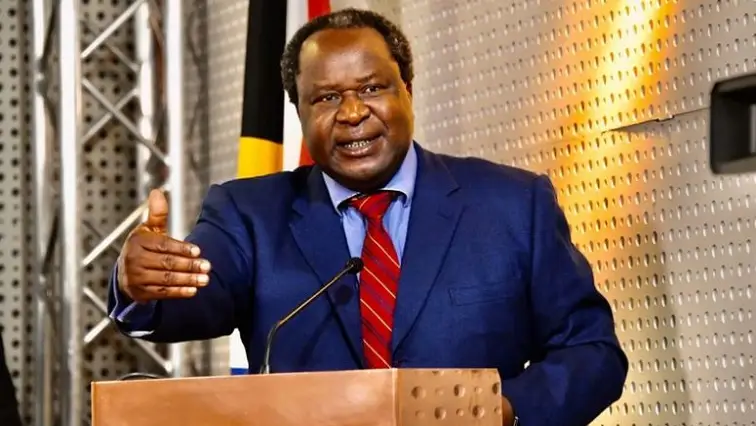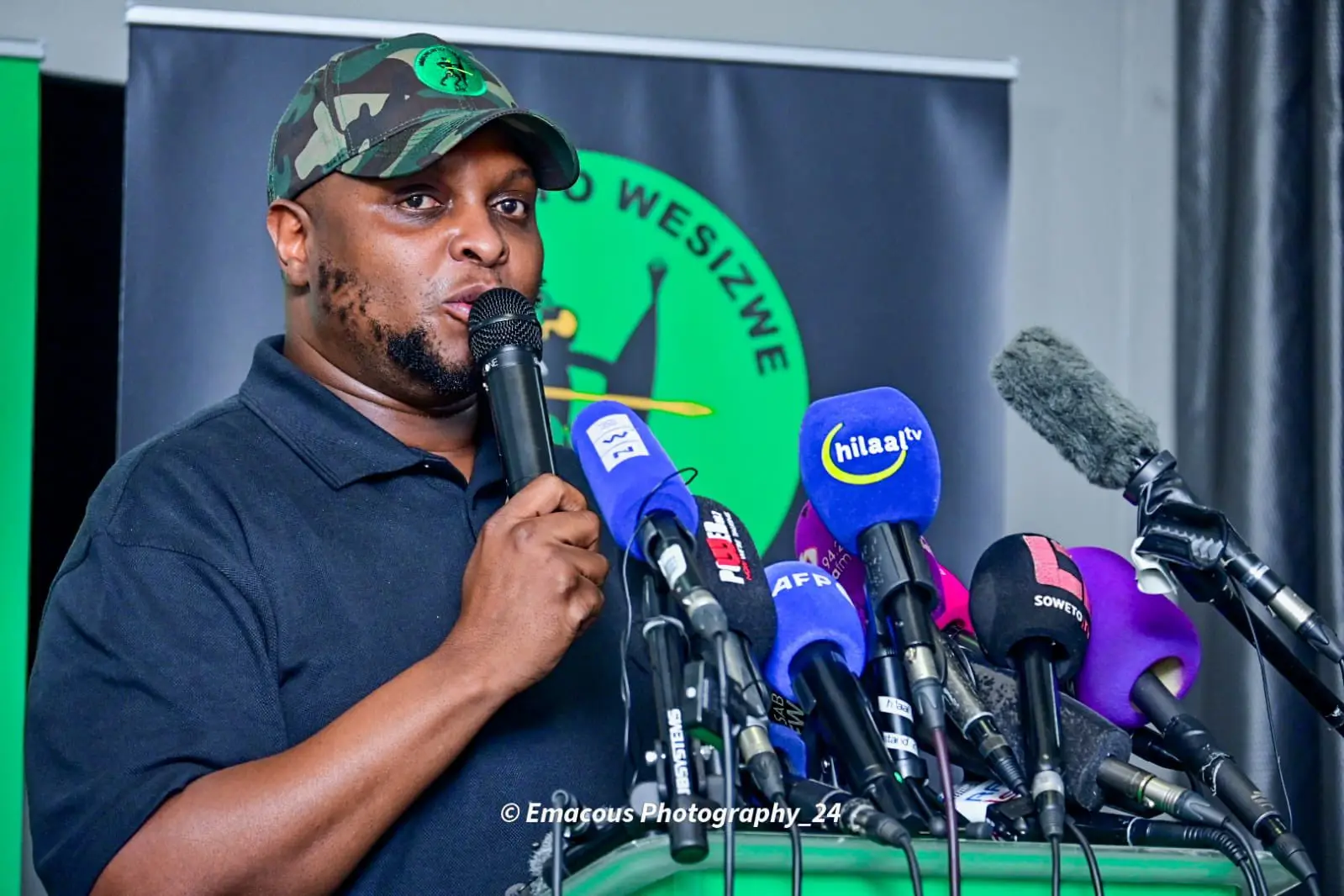South Africa’s political landscape is one of constant flux, marked by shifting alliances, the rise of new political movements, and the fallout from internal power struggles. One of the most recent and significant developments is the departure of Mzwanele Manyi and Floyd Shivambu from the Economic Freedom Fighters (EFF) to the newly formed MK Party. This event has sent ripples through the political sphere, raising questions about the stability and future of the EFF. Amid this upheaval, the silence of Mbuyiseni Ndlozi, once a prominent voice within the EFF, is both notable and telling. This silence is not just an absence of words; it is a reflection of deeper issues within the EFF and Ndlozi’s complicated relationship with Julius Malema, the party’s charismatic yet controversial leader.
Mbuyiseni Ndlozi: A Political Background
Mbuyiseni Ndlozi, widely known as “The People’s Bae,” emerged as one of the most recognizable figures in South African politics after the EFF’s formation in 2013. His appointment as the party’s national spokesperson catapulted him into the public eye, where his articulate and passionate speeches resonated with many, particularly the youth. Ndlozi’s academic background, underscored by his Ph.D. in Political Science from the University of the Witwatersrand, gave him an intellectual gravitas that was relatively rare in the often populist world of South African politics.
As the national spokesperson, Ndlozi was the face of the EFF’s communication strategy, adept at defending the party’s positions and countering its critics. His tenure in this role was marked by his sharp wit, eloquence, and ability to engage with both supporters and detractors in a manner that was both forceful and engaging. He was not just a spokesperson; he was a key figure in shaping the party’s public image and articulating its vision of economic freedom and social justice.
However, as the EFF grew in prominence and Malema consolidated his power, Ndlozi’s position within the party began to diminish. His role as spokesperson was eventually taken over by Vuyani Pambo, and while Ndlozi remained a member of the Central Command Team, his influence within the party’s inner circle appeared to wane. This sidelining was gradual but unmistakable, and it set the stage for the current period of silence and uncertainty in Ndlozi’s political career.
Sidelined by Malema: The Subtle and Not-So-Subtle Signs
The relationship between Mbuyiseni Ndlozi and Julius Malema has always been complex, characterized by both admiration and tension. To Ndlozi, Malema was more than just a party leader; he was a mentor, a political icon who had the audacity to challenge the status quo in South Africa. However, Malema’s leadership style, which increasingly veered towards autocracy, created an environment where dissent was not tolerated, and loyalty was often demanded rather than earned.
Over time, Ndlozi found himself increasingly marginalized within the party. While his intellectual contributions were still valued publicly, within the inner workings of the EFF, his role was diminished. This marginalization was not just political but personal. There are numerous accounts of how Malema, in public and private settings, would treat Ndlozi more like an errand boy than an equal.
One particularly telling example of this dynamic was how Malema would often ask Ndlozi to fetch him water or open water bottles for him during meetings and public events. This behavior, which was witnessed by many within the party, was symbolic of the hierarchical and, some would argue, patriarchal nature of the EFF under Malema’s leadership. Ndlozi, despite his education and status within the party, was often reduced to performing menial tasks, reinforcing the power imbalance between him and Malema.
This dynamic was not lost on Ndlozi’s supporters and detractors alike. Many within the EFF saw it as a sign of Malema’s growing arrogance and his need to assert dominance over those around him. For Ndlozi, who had entered politics with the idealistic vision of fighting for economic freedom and social justice, this treatment was likely both humiliating and disillusioning. Yet, out of loyalty to the party and perhaps fear of further marginalization, Ndlozi remained silent, publicly at least, about these incidents.
Education, Aspirations, and Intellectual Integrity
Mbuyiseni Ndlozi’s academic achievements set him apart from many of his contemporaries in the EFF. His Ph.D. thesis reflects his deep commitment to the ideals of democracy, social justice, and critical engagement with power. Ndlozi has always been more than just a politician; he is an intellectual, someone who has consistently sought to marry theory with practice in the pursuit of a better South Africa.
This intellectual integrity has been both a strength and a liability for Ndlozi within the EFF. On the one hand, his academic background gave him the credibility and gravitas to engage with complex political issues in a way that resonated with both supporters and critics of the party. On the other hand, it also made him less malleable and more independent-minded than some of his colleagues, which, in the context of Malema’s increasingly autocratic leadership, may have been seen as a threat.
Ndlozi’s aspirations have always been aligned with his academic and ideological roots. He has a deep-seated commitment to the idea of a truly democratic South Africa, one where economic inequality and social injustice are addressed not just in rhetoric but in practice. However, as the EFF has grown, it has increasingly become a party dominated by Malema’s personality and personal ambitions. This shift has made it difficult for someone like Ndlozi, who values intellectual debate and democratic engagement, to find a place within the party.
The departure of Floyd Shivambu, who was not just a colleague but a close friend and ally of Ndlozi, has only heightened the sense of alienation that Ndlozi likely feels within the EFF. Shivambu’s decision to leave the party was reportedly driven by disagreements with Malema’s leadership style and the direction in which the party was heading. For Ndlozi, who has always looked up to Malema as a mentor and leader, Shivambu’s departure may have forced him to confront the reality that the EFF is no longer the party he once believed in.
Looking Up to Malema: From Mentor to Tyrant?
Julius Malema has always been a polarizing figure in South African politics. To his supporters, he is a fearless leader who speaks truth to power and fights for the marginalized. To his detractors, he is an opportunist and a demagogue who uses populism to further his own political ambitions. For Mbuyiseni Ndlozi, Malema was both an inspiration and a mentor, someone who provided him with a platform to voice his ideas and influence the political discourse in the country.
However, as time has gone on, the relationship between Malema and Ndlozi seems to have deteriorated. Malema’s leadership style, often described as dictatorial, has alienated many within the party, including some of its founding members. Ndlozi, who has always been more of a consensus-builder, may have found it increasingly difficult to reconcile his own ideals with the direction in which Malema was taking the party.
There have been numerous instances where Malema’s treatment of Ndlozi has raised eyebrows. Beyond the symbolic acts of subservience, such as fetching water, there have been reports of Malema publicly berating Ndlozi and other members of the party’s leadership for perceived failures or disagreements. These incidents have contributed to a culture of fear and compliance within the EFF, where dissent is not tolerated, and loyalty to Malema is paramount.
For Ndlozi, who entered politics with a vision of democratic engagement and collective leadership, this environment must be stifling. The departure of Floyd Shivambu, someone who was both a friend and an ideological ally, may have been a turning point for Ndlozi. Shivambu’s decision to leave the EFF for the MK Party, which promises a more democratic and less autocratic approach to leadership, could serve as a model for Ndlozi’s own potential departure.
The Slow Death of the EFF: A Party in Crisis
The EFF, once seen as a vibrant and dynamic force in South African politics, is now facing a crisis of identity and leadership. The departure of key figures like Mzwanele Manyi and Floyd Shivambu to the MK Party is symptomatic of deeper issues within the party. The EFF’s initial appeal was its radical stance on economic freedom, land reform, and anti-corruption. However, as the party has grown, so too have the internal power struggles and ideological differences.
Malema’s increasingly autocratic leadership style has alienated many within the party, leading to an exodus of some of its most prominent and ideologically committed members. The departure of Manyi, a media mogul and former ANC member, to the MK Party was particularly significant. Manyi, who joined the EFF in 2023, brought with him a wealth of experience and a commitment to the party’s ideals. However, his departure, along with Shivambu’s, highlights the growing discontent within the EFF.
The slow death of the EFF is not just about the departure of key figures; it is about the erosion of the party’s founding principles. What was once a movement committed to radical economic transformation and social justice is now increasingly seen as a vehicle for Malema’s personal ambitions. The party’s internal democracy has been undermined, and the culture of debate and dissent that once characterized the EFF has been replaced by a culture of fear and compliance.
Ndlozi’s silence in this context is telling. It suggests a man who is grappling with his own future within a party that he once believed in but now finds himself at odds with. The question that remains is whether Ndlozi will follow in the footsteps of Shivambu and Manyi and seek a new political home, or whether he will continue to remain silent and marginalized within the EFF.
Conclusion
Mbuyiseni Ndlozi’s silence in the wake of the departures of Mzwanele Manyi and Floyd Shivambu from the EFF is not just a political statement; it is a reflection of the broader crisis within the party. Ndlozi, a man of deep intellect and conviction, now finds himself at a crossroads. As the EFF continues its slow decline, Ndlozi may be forced to make a difficult decision: remain within a party that no longer aligns with his values, or follow in the footsteps of Shivambu and Manyi and seek a new political home.
The future of the EFF, and Ndlozi’s place within it, remains uncertain. What is clear, however, is that the party is no longer the united force it once was. The silence of Mbuyiseni Ndlozi may very well be the calm before the storm, a prelude to a seismic shift in South African politics. Ndlozi’s silence is a powerful testament to the internal turmoil within the EFF and serves as a stark reminder that the party’s future is far from assured. As the EFF faces its most significant crisis since its formation, the decisions of individuals like Ndlozi will play a crucial role in shaping the future of the party and, by extension, the political landscape of South Africa.






